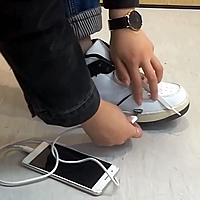
Wearable ubiquitous energy system
Deng, Fang; Ding, Ning; Ye, Ziman; Cai, Yeyun; Chen, Jie
Sci China Inf Sci, 2021, 64(2): 124201
In recent years, owing to the growing maturity of Internet of Things technology and mobile communication technology, intelligent wearable devices have developed rapidly. They have been widely applied in aviation, medicine, military, entertainment and other fields. Through intelligent wearable devices, people can communicate efficiently, dynamically perceive external environments, and monitor the body's vital signs. The devices can also timely feedback and process information. However, on the one hand, wearable devices are restricted by the requirements of comfort, portability and miniaturization. On the other hand, traditional batteries also have problems such as large quality, large volume, short battery life and limited power supply life. In addition, non-active power generation has low power density and poor continuity, which is not enough to support equipments for a long time. Energy supply has been the bottleneck restricting further development of wearable devices.